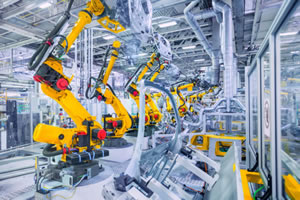The Fourth Industrial Revolution: Technology alliances lead the charge
 Ben Rossi for Information Age: The Fourth Industrial Revolution is changing the very concept of manufacturing. Within the smart factory, software-defined automation allows manufacturers to link all stages of the value chain, rapidly adapt to changing markets, and create highly personalised products on a mass scale. These machines communicate their health and status in real time, increasing efficiency and throughput and minimizing downtime.
Ben Rossi for Information Age: The Fourth Industrial Revolution is changing the very concept of manufacturing. Within the smart factory, software-defined automation allows manufacturers to link all stages of the value chain, rapidly adapt to changing markets, and create highly personalised products on a mass scale. These machines communicate their health and status in real time, increasing efficiency and throughput and minimizing downtime.
The opportunities presented by this revolution are incredible. According to McKinsey, the economic impact of smart factories could reach up to $2.3 trillion per year by 2025.
At the heart of the Fourth Industrial Revolution is the Internet of Things (IoT), which uses digital technology to connect sensors, actuators, and machines to each other and to factory workers. The IoT enables a broad swath of transformational opportunities, including open-standards-based automation solutions, IT and operational technology (OT) convergence, and vastly enhanced business intelligence.
These opportunities flow from the IoT’s ability to handle enormous variety, velocity and volumes of data. Many manufacturers are already feeling the benefits of this access to industrial IoT (IIoT) data. In an Economist Intelligence Unit study of senior factory executives, 86% reported major increases in shop floor data collection over the past two years, and two-thirds said data insights have led to annual quality and efficiency savings of 10% or more. Full Article:
Comments (0)
This post does not have any comments. Be the first to leave a comment below.
Featured Product

